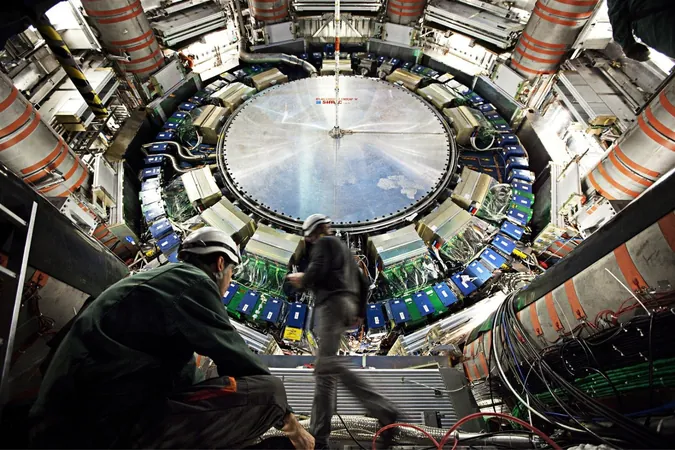
Twin Physicists Unveil 'Magic' in Quarks at the Large Hadron Collider!
2024-12-20
Author: Jacob
Introduction
In a fascinating alignment of advanced technology and theoretical physics, twin physicists, known as the White brothers, have uncovered insights into what they are calling 'magic' within the enigmatic world of quarks at the Large Hadron Collider (LHC). This breakthrough not only hints at new dimensions of particle physics but also touches the realm of quantum computing, igniting excitement in both scientific and technological communities.
The Large Hadron Collider and its Significance
The Large Hadron Collider, famously credited with the discovery of the Higgs Boson in 2012, continues to be a pivotal asset in unraveling the complexities of particle physics. Operating since 2008, the LHC has provided invaluable data that has shaped our understanding of the fundamental building blocks of the universe, including the elusive nature of quarks, which are essential components of protons and neutrons.
The Breakthrough by the White Brothers
The White brothers, who split their academic endeavors between Queen Mary University of London and the University of Adelaide, recently published a study in Physical Review D that probes a peculiar aspect of top quarks—specifically, their 'magic'. This term, which measures how challenging it is for classical computers to simulate quantum states, is significant because it could signal how well-suited certain particles are for potential applications in quantum computing.
Importance of 'Magic' in Quantum Computing
“What we’re exploring is how properties of top quarks align with the capabilities needed to harness quantum computing,” Chris White explained in a press release. Top quarks, the heaviest flavor in the quark family, embody complex behaviors that could unlock revolutionary computing technologies.
Research Implications
What sets this research apart is its exploration of the relationship between quantum computation and the 'magic' property of particles—serving as a crucial indicator of computational power. The research raises fundamental questions: Does nature inherently create 'magic' top quarks in collider experiments, and if not, what are the constraints limiting this phenomenon?
Industry Impact and the Race for Quantum Supremacy
Additionally, the implications of this work reach beyond simple particle physics. Martin White, co-author of the study, emphasized the relevance of their findings: "The higher the magic, the greater our need for quantum computers to understand the behavior of these particles," he noted. As quantum computers operate using qubits—transformative bits of information that exist in multiple states simultaneously—they hold the promise of handling problems far beyond the reach of their classical counterparts.
There's a palpable excitement in the industry as leading tech companies mount a race to achieve quantum supremacy. Recently, the quantum computing company Quantinuum declared its machine surpassed Google's famed quantum computer by a factor of 100 in demonstrating quantum supremacy. Meanwhile, Google's latest quantum chip, named Willow, boasts the intriguing ability to perform calculations in a fraction of a second that would take traditional supercomputers epochs to achieve.
The Future of Particle Physics and Quantum Computing
The LHC itself returned to action in 2022 after a three-year pause to undergo significant system enhancements, thus reigniting the quest for answers surrounding the mysteries of dark matter and beyond. Last year, CERN's CMS experiment, the heaviest setup at the LHC, reported promising advancements in its search for dark photons, a candidate for dark matter theorization.
In a world where 'magic' seems to weave itself intricately into the fabric of physics, the work of the White brothers at the LHC not only opens new doors in our understanding of particles but also hints at a future where quantum computing could redefine the limits of human knowledge. As this thrilling research continues to unfold, one thing remains certain: the fusion of particle physics and advanced technology may lead to a revolution that truly feels magical.









 Brasil (PT)
Brasil (PT)
 Canada (EN)
Canada (EN)
 Chile (ES)
Chile (ES)
 Česko (CS)
Česko (CS)
 대한민국 (KO)
대한민국 (KO)
 España (ES)
España (ES)
 France (FR)
France (FR)
 Hong Kong (EN)
Hong Kong (EN)
 Italia (IT)
Italia (IT)
 日本 (JA)
日本 (JA)
 Magyarország (HU)
Magyarország (HU)
 Norge (NO)
Norge (NO)
 Polska (PL)
Polska (PL)
 Schweiz (DE)
Schweiz (DE)
 Singapore (EN)
Singapore (EN)
 Sverige (SV)
Sverige (SV)
 Suomi (FI)
Suomi (FI)
 Türkiye (TR)
Türkiye (TR)
 الإمارات العربية المتحدة (AR)
الإمارات العربية المتحدة (AR)